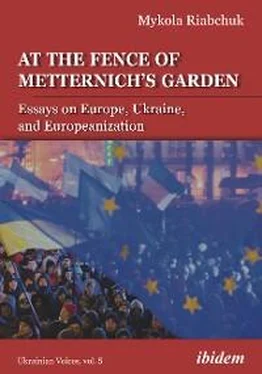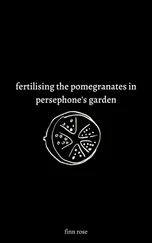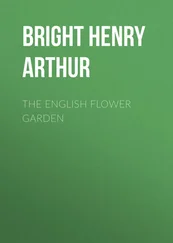“Hard borders are not even very useful for combating cross-border crime. Most experts agree that improving police and security cooperation between countries is a more efficient alternative than hiring lots of border guards or buying expensive surveillance technology” [Zielonka 2004: 29]. “Extensive research shows that numbers of migrants will be limited, and that organized crime is much better fought through targeted, intelligence-led policing in the cities, not border controls and visas alone. Criminals usually have access to passports and forged documents, so new border controls will have a much bigger effect on Ukrainian traders and Belarusian peasants than on organized crime. But politics is often irrational—opportunistic politicians (like Jörg Haider) exploit potent fears of uncontrolled migration, even if these fears are unfounded” [Grabbe 2001: 42].
In sum, we should probably recognize that Europe would never become a genuinely cultural project, as Denis de Rougemont and other Kulturliterati envisaged. There is too much of Realpolitik around, too much of ‘might makes right’ and ‘charity begins at home’. There are too powerful forces and too strong temptations to make project Europe genuinely political and economic. And this is why we should still produce our low-circulation books and esoteric journals, and carry out our discussions on European culture, identity, and solidarity. We cannot complete our idealistic project but we can probably rescue it from ultimate degradation.
For Ukrainians and other East European nations who have been cynically (‘pragmatically’) excluded from Europe as a political project, culture remains the only field where they can cherish their imaginary Europeanness, and look for symbolic resources that might enhance their resistance to the dark neo-Soviet/neo-imperial forces that loom large in the East. Again and again, they should refer to Norman Davies’ encouraging dictum: “The right to be referred to as to ‘Europe’ (…) cannot be granted to just one part of the continent. Eastern Europe has never ceased to be European only because it was poor, underdeveloped, or ruled by tyrants. On the contrary, due to the fact that it was deprived of so many things, it became more European, more attached to the values that may be taken for granted by more prosperous citizens of the West” ( Tygodnik Powszechny 18, 1992).
The impressive Orange Revolution in Ukraine, otherwise unexplainable, came fully in line with these perspicacious words, as well as with Adam Zagajewski’s earlier deliberations—relevant, as it appeared, not only in Central but also in Eastern Europe: “Soviet Russia has created some very strange things in our part of Europe. It has created informants, liars, censors, and bums who don’t feel like working. But at the same time, without wanting to, it has produced wonderful things in people who by the grace of God are stronger, and somehow more noble. It has aroused in them a wild hunger for truth, freedom, dignity, books, paintings … for Europe. And this is exactly how Europe exists in Central Europe—as a Europe of the imagination, of delusion, of hope, of hunger … The enormous cultural longing felt so strongly in our part of Europe is one of the paradoxical consequences of ‘Sovietization’” [1987: 21].
However critical we might be of fortress Europe and however unhappy we might feel with Wallerstein’s world-economy, we should clearly understand that no one can change these odd systems from the outside, if at all. No outsiders’ complaints would be heard inside or, if heard, taken seriously. All these complaints apriori are compromised as laments of lazy-bones, failures, or crazy leftists. Sometimes, or perhaps often, it’s true. But the West/Rest problem exists, and any attempt to cushion it or, at least, to facilitate cushioning—as our modest intellectual activities do—should be continued despite all setbacks.
2005
1Cf. the conclusion made by the same reputable Polish sociologist: “Research reveals that there are no reasons to fear any new wave of the labour migration from Ukraine. It seems that everybody who wanted to move, has moved. In the meantime, the great majority of the citizens is absolutely not interested in any issues related to search for a job abroad. The group of travellers is rather narrow, albeit very active” (Ibid., p. 10).
In a recent [2005] interview for a leading Polish newspaper, a former French president and, at present, the head of the European constitutional convention, Valery Giscard d’Estaing had to answer a boring question that only importunate Poles could raise in a serious European conversation. The question was, yes, about Ukraine, specifically—about its eventual EU membership prospects.
Well, the president mused,
I feel that insistence on its membership is definitely premature. The problem requires deeper analysis. The borders of contemporary Ukraine were drawn by the Soviets in only around 1957. This causes controversies between Moscow and Kyiv. The Crimea, for instance, never historically belonged to Ukraine. A part of Ukraine has, indeed, a European character—these are the lands that had belonged to Poland and, earlier, to the Polish-Lithuanian Commonwealth. But the territories behind the Dnieper river and those to the south have a Russian character. Those lands cannot belong to the European Union as long as Russia is not admitted to the EU. Therefore, we should wait and see how things develop ( Rzeczpospolita, 26–27 November 2005).
The answer is graphic and, in a way, paradigmatic. It was made not by somebody from the street, like a tabloid reader or writer, but by a prominent politician who, for decades, has influenced and still influences European politics. A deplorable mixture of ignorance, biases and malevolence says a lot on how Ukraine still is perceived in the West and what kind of ‘new neighborhood’ politics could be expected at Brussels in the nearest future.
Ignorance is the least reprehensible in Giscard d’Estaing’s statement. Ukraine’s borders were finally drawn in 1954, not 1957. The territories behind the Dnieper river, the so-called Left-Bank Ukraine, are no more Russian in character than the Right Bank, whatever this ‘Russian character’ might mean. Both of them belonged historically to the Polish-Lithuanian Commonwealth, which stretched as far as the contemporary borders of the Russian Federation and Kharkiv region. And the patterns of political behavior in both these regions are not much different, as anybody can discern looking at the respective results of elections and/or opinion polls.
The most striking thing in Giscard d’Estaing’s statement is the whimsical logic that a reputable politician employs or, rather, manipulates. At the very beginning, he makes a slight but significant shift in discourse, answering actually not the question that was put. The journalist’s question was about Ukraine’s membership prospects, which were basically guaranteed by Article 49 of the EU Treaty: any European state that firmly meets the Copenhagen criteria can apply for membership. Neither Giscard d’Estaing nor any other responsible politician can deny these prospects as long as the EU Treaty is in force. He pretended, however, that the question was not about remote prospects (in principle, undeniable) but about immediate membership (ridiculous, of course, since Ukraine is indeed far away from the required criteria—but probably not further than Albania, or Bosnia & Herzegovina, let alone Kosovo). No doubt, “insistence on Ukraine’s membership is definitely premature”, as Mr. d’Estaing put it. The only problem, however, is that neither Ukrainian politicians nor the Polish journalist have ever “insisted” on Ukraine’s immediate membership or questioned its “prematurity”. They only wanted Mr. d’Estaing (and other EU officials) to confirm Article 49 and perhaps to speculate a bit on Ukraine’s long (but undeniable) way towards the required criteria.
Читать дальше












